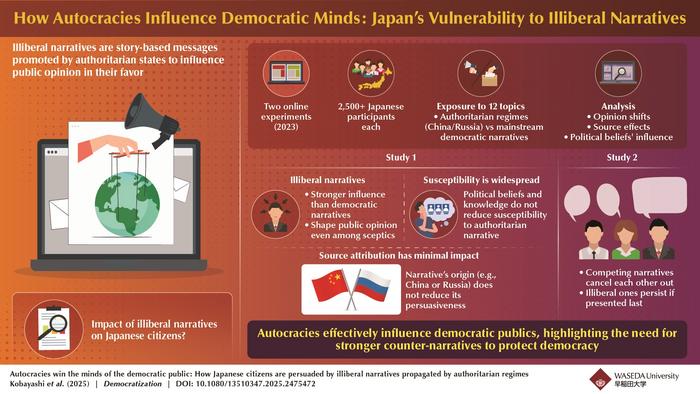In recent times, the influence of authoritarian narratives from countries like China and Russia has become a pressing concern for democracies worldwide. A revealing study out of Japan provides a comprehensive analysis of how these illiberal narratives resonate with Japanese citizens, casting a shadow over the country’s democratic discourse. The research, led by Professor Tetsuro Kobayashi and his team, underscores a stark reality: Japanese society is increasingly susceptible to persuasive messaging originating from authoritarian regimes.
The study published on March 12, 2025, in the journal "Democratization," draws on extensive empirical data gathered through an online survey experiment. The objective was to measure how Japanese respondents reacted to narratives propagated by both authoritarian and democratic sources. This experiment provided insights into the effectiveness of messaging from illiberal regimes compared to mainstream democratic narratives, revealing a disturbing trend. The findings concluded that illiberal narratives carried more weight and influence than democratic messaging, a startling discovery considering the established norms of political persuasion.
The team’s methodology involved exposing participants to various narrative forms while gathering data on shifts in opinion. What emerged was both surprising and alarming: the persuasive power of illiberal narratives transcended political affiliations, demographics, and even self-identified levels of political knowledge. This finding starkly contradicted previous studies in different contexts, such as Germany, where lower political knowledge and authoritarian sympathies were linked to a greater susceptibility to such narratives. In Japan, however, this susceptibility appeared universal across the population, raising vital questions about the robustness of democratic engagement in the face of foreign misinformation.
Several key insights stemmed from the research that warrant discussion. Firstly, participants showed an inclination towards accepting illiberal narratives, even when the narratives’ origins were overtly identified. This aspect of the study suggests that irrespective of overt ideological lines, there exists a deeper cognitive alignment with the simplicity and directness often found within authoritarian messaging. Such narratives tend to provide clear answers and solutions, which can be particularly appealing in complex social and political contexts.
Moreover, when both democratic and illiberal narratives were assessed simultaneously, their persuasive impacts largely neutralized one another. Interestingly, when an illiberal narrative was presented following a democratic one, its persuasive effect remained intact. This phenomenon highlights an unsettling aspect of narrative competition: once an illiberal message enters public discourse, it appears increasingly challenging to mitigate its influence, suggesting a robust mechanism of mnemonic persistence that favors authoritarian ideologies.
The study additionally indicated that even those within the Japanese public who possess a strong foundation of political knowledge did not demonstrate a higher resilience against these illiberal narratives. This aspect raises a fundamental concern regarding the effectiveness of political education or discourse as a countermeasure against manipulative propaganda. Unlike Germany, where knowledge was shown to mitigate susceptibility, Japan’s experience unveils a more pervasive vulnerability that could jeopardize democratic discourse.
These findings have broader implications beyond understanding Japanese political dynamics. Japan plays a significant role within the fabric of the US-led liberal international order. If the Japanese public becomes increasingly receptive to authoritarian narratives, it could precipitate undesirable shifts in foreign policy, potentially undermining alliances that have sustained regional security and democratic values. Such a transition could amplify the influence of authoritarian regimes in the Pacific, fundamentally altering the balance of power in the region.
The potential ramifications of continuing down this path illustrate how the spread of illiberal propaganda can erode public trust in democratic institutions. If citizens continuously entertain illiberal narratives that favor authoritarian principles, the very foundation of democratic engagement could falter. This underscores the importance of addressing cognitive warfare tactics employed by authoritarian regimes aiming to fracture societal consensus.
Given the evolving landscape of information dissemination characterized by social media and digital platforms, Japan, like many democracies, requires enhanced defenses against manipulative narratives. Experts emphasize the urgency of fortifying democratic resilience by cultivating an informed citizenry that is adept at critical thinking and aware of foreign influence strategies. The promotion of media literacy, robust public discourse, and enhanced counternarrative frameworks will be essential in safeguarding democratic values in an increasingly contested information landscape.
In conclusion, the research led by Professor Kobayashi and his colleagues serves as a clarion call for democratic societies to reinvigorate their defenses against the encroachment of illiberal narratives. The study illustrates that the battle of ideas, particularly in the shadow of authoritarian influence, is far from over. Without a concerted effort to bolster democratic discourse and engage citizens meaningfully, societies may find themselves at an increasingly perilous crossroads, where the allure of illiberal simplicity continues to overshadow democratic complexity.
Subject of Research: People
Article Title: Autocracies win the minds of the democratic public: how Japanese citizens are persuaded by illiberal narratives propagated by authoritarian regimes
News Publication Date: 12-Mar-2025
Web References: https://doi.org/10.1080/13510347.2025.2475472
References: DOI: 10.1080/13510347.2025.2475472
Image Credits: Credit: Tetsuro Kobayashi from Waseda University, Japan
Keywords: Democracy, Authoritarianism, Public opinion, Psychological warfare




